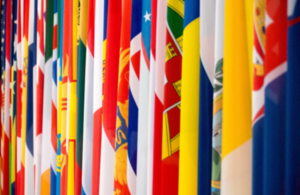UK statement on gender at HDIM 2019
Delivered by Susan Vierny, Second Secretary at the UK Delegation to the OSCE, at the Human Dimension Implementation Meeting (HDIM), 20 September 2019.

Thank you Mr/Mme Moderator
The UK aligns itself with the EU Statement delivered by Finland and would like to make some additional comments in a national capacity.
Promoting gender equality and women’s rights across the world is a priority for the UK. This is reflected in the Department for International Development’s Strategic Vision for Gender Equality: Her Potential, Our Future. The UK undertakes a wide variety of work to promote gender equality, both domestically and internationally, but I would like to take this opportunity to highlight a few UK actions and objectives on gender.
On 16 July this year, the UK Government introduced into Parliament a landmark Domestic Abuse Bill. Whilst domestic violence is not gender-specific, the majority of victims are women. The Bill’s introduction followed extensive consultations during which the government sought the views of victims, support organisations and frontline professionals. A draft Bill was also the subject of pre-legislative scrutiny by a Joint Committee of both Houses of Parliament.
The UK Domestic Abuse Bill introduces the first ever statutory definition of domestic abuse. It recognises the many forms that abuse can take and encompasses, but is not limited to, psychological, physical, sexual, economic and emotional abuse. The UK Government is committed to re-introducing the Bill in the new session of Parliament starting on 14 October.
As we are all aware, rape and other forms of sexual violence continue to be used as weapons of war. It is of the utmost importance that we tackle conflict related sexual violence. The UK’s Preventing Sexual Violence in Conflict Initiative (PSVI) launched by our then Foreign Secretary, William Hague, and UNHCR Special Envoy Angelina Jolie, remains a top priority for the UK Government.
We aim to tackle stigma faced by survivors of sexual violence, secure justice for survivors and shatter the culture of impunity by holding those responsible to account, as well as strengthen efforts to prevent sexual violence in conflict. The UK will host a PSVI international conference on 18-20 November 2019 in London to mark five years since the Global Summit to End Sexual Violence. The three-day event will celebrate successes, share best practice and address the remaining challenges.
As the UN Security Council lead on UNSCR 1325, the UK will continue to ensure that the Women, Peace and Security agenda is front and centre at the Security Council in the run up to its twentieth anniversary in 2020. We have identified, as a priority, the need to strengthen implementation of UNSCR 1325. We are doing this by supporting women’s meaningful participation in peace processes and increasing support to women resolving conflict, countering violent extremism and building peace at the grassroots. Last year the UK spent £200 million of programmatic funds in support of gender equality.
Women’s political participation is one of the main strands of the Women, Peace and Security agenda, which is part of our broader work on gender equality. In November 2018, we convened the ‘Women MPs of the World’ conference. The event brought together over 100 elected women parliamentarians from across the globe, to celebrate their achievements, and discuss how to strengthen visibility and further empower parliamentarians to continue to drive change nationally and internationally.
Globally, over 130 million girls are missing out on the education they need to develop essential life skills. We are committed to championing 12 years of quality Education for all girls through the #LeaveNoGirlBehind Campaign; and our Girls’ Education Challenge is the world’s largest fund dedicated to girls’ education. It is now supporting up to 1.5 million marginalised girls in 17 countries across Africa and in Afghanistan, Pakistan and Nepal.
Finally, the diversity and inclusivity of our own workforces and cultures, of which gender is an integral part, is extremely important for us all. It is not a ‘nice to have’ but essential. It is only by harnessing the varied perspectives and ways of thinking, and the creativity, credibility and trust that these bring with them, that we will achieve the outcomes we want to see and leave a better world to the next generation. That’s why our Civil Service has set itself the ambition to be our country’s most inclusive employer. And that’s also why, as a society, we have committed to tackling the pay difference between men and women in every sector.
Since 2017, every UK organisation that has 250 or more employees has to publish and report specific figures on their gender pay gap. Over 10,000 employers report their gender pay gap each year; providing an unparalleled level of transparency and pushing employers to take real action to close the gap. Reporting is just the start, it is crucial that employers use their gender pay gap data to identify the barriers to women’s recruitment and progression, and take action to break down those barriers.
As we look ahead to future challenges, the UK will continue to assess where it needs to do more both domestically and internationally.